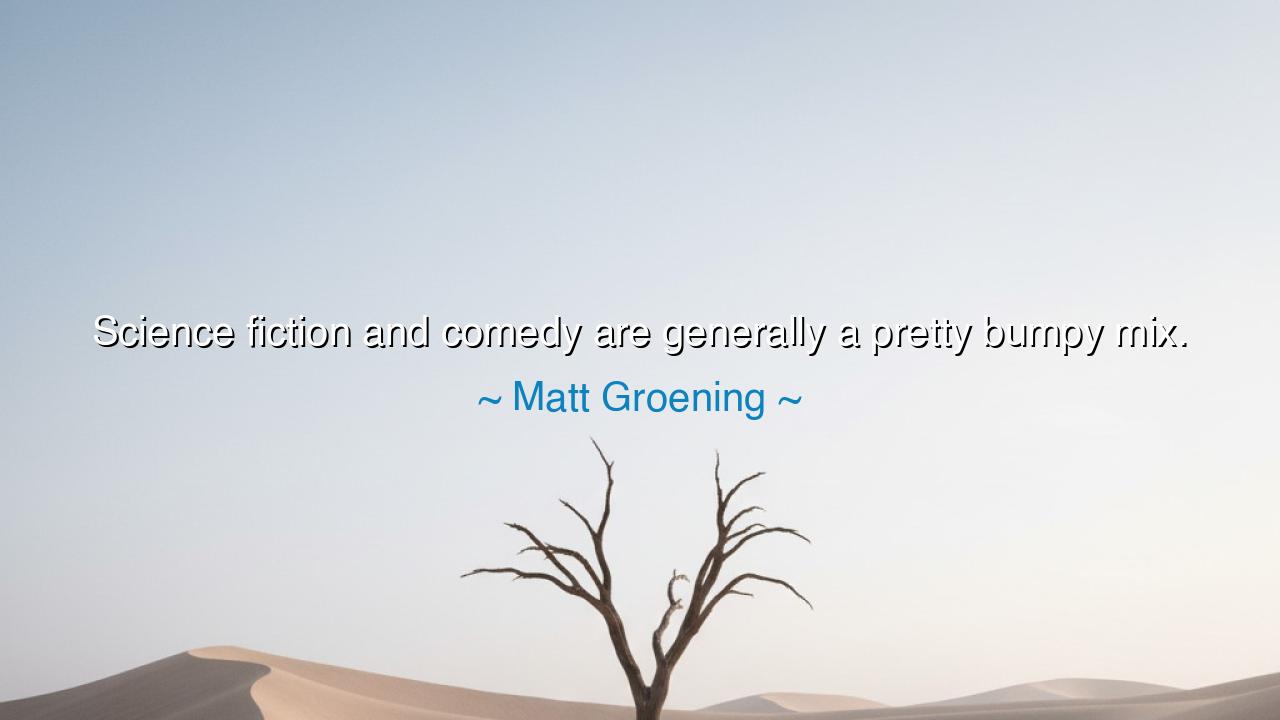
Science fiction and comedy are generally a pretty bumpy mix.






"Science fiction and comedy are generally a pretty bumpy mix." These words from Matt Groening, the creator of The Simpsons, carry an inherent truth about the delicate balance between two powerful genres—science fiction and comedy. At first glance, they seem like strange bedfellows. Science fiction—a genre grounded in the exploration of the unknown, the technological marvels, and the future of humanity—seeks to stretch the boundaries of possibility, often invoking awe, wonder, and sometimes fear. On the other hand, comedy thrives on humor, often revealing the absurdities of life and our collective human nature through laughter. To blend these two forms is, indeed, a bumpy mix, for the seriousness of science fiction can clash with the lightness of comedy, creating a tension that can either result in brilliance or dissonance.
In the ancient world, there was a similar tension between two forms of intellectual pursuit—philosophy and humor. Aristotle, the great Greek philosopher, valued reason and the search for truth above all, but he also understood the place of humor in the human experience. In his Poetics, he recognized comedy as a form of art that could reflect the human condition, often by exposing our flaws through irony and exaggeration. Yet, even in the ancient plays of Aristophanes, the blend of serious themes with laughter was a fine line. The plays of Aristophanes often mixed the sharp critique of politics and society with satire and humor, showing how the combination of seemingly opposing forces could create profound commentary. Thus, like Groening's observation, the mixture of science fiction and comedy can bring forth both insight and chaos, depending on how well the two elements are balanced.
Science fiction, with its roots in the ancient mythologies, has always held a certain seriousness—the desire to explore the unknown and to contemplate the future of humanity. Plato, in his Republic, imagined a society governed by reason, in which philosophers would rule. Though not science fiction in the modern sense, his writing began the tradition of envisioning ideal or dystopian futures based on human reason and ethics. Later, Isaac Asimov, in his Foundation series, weaved a tale of a galactic empire, rooted in mathematical predictions, and the fate of human civilization. Asimov's works were grounded in the seriousness of scientific principles, exploring the complexities of technology, society, and humanity. The very nature of science fiction, like Plato’s vision, demands a seriousness, a respect for the mysteries of the universe, which often makes it difficult for comedy to break through.
However, comedy is no stranger to tackling complex topics with humor. In Aristophanes’ works, political satire was used to reflect on the most pressing issues of the day, from war to democracy. The blending of humor with serious themes could, and still does, reveal profound truths about human nature. For instance, Monty Python’s Life of Brian, a satirical comedy set in ancient Judea, blends historical themes with absurd humor to critique religion, politics, and society. In this film, comedy serves as a way to address the most serious issues of faith and humanity, proving that humor can sometimes be the most effective tool for exploring difficult and complex truths.
But Groening’s quote is a recognition of the challenge that comes with mixing comedy with the often solemnity of science fiction. While science fiction grapples with weighty concepts—the future of humanity, the consequences of technological advances, and the mysteries of the universe—comedy seeks to ease the weight of those concepts with laughter. The natural tension between these two can often lead to disjointed storytelling, where the humor undermines the depth of the themes or the themes overshadow the light-hearted tone. Groening's own work in The Simpsons reflects a delicate balance between satire and seriousness, showing that humor can be used to criticize and reveal truths about modern society, but that balance is key.
The lesson here is one of balance—a reminder that combining seemingly opposing forces can lead to either chaos or brilliance. Like the ancients, who balanced the philosophical with the humorous, we must recognize that both science fiction and comedy have their places, but their combination requires skill and delicacy. To blend these two genres effectively is to understand their unique roles in human storytelling—to explore complex ideas without losing the lightness that makes laughter a tool for profound reflection.
In your own life, seek to balance the serious and the light, the rational and the imaginative. Whether you are a writer, a scientist, or someone navigating the complexities of daily life, recognize that both logic and humor have their place. Learn to mix them wisely, to use humor to illuminate the truths of our world, but not to escape from the challenges that demand our deepest thinking. Just as the ancient philosophers used humor to comment on the human condition, so too must we use comedy and science fiction as tools for reflection, while always maintaining the respect that these serious themes deserve.






AAdministratorAdministrator
Welcome, honored guests. Please leave a comment, we will respond soon